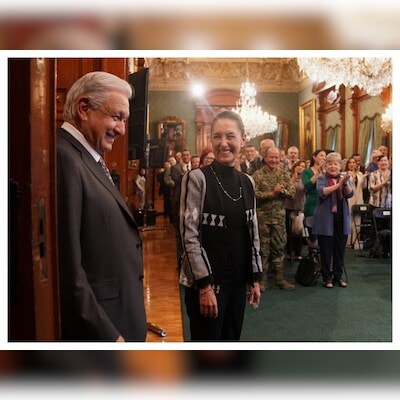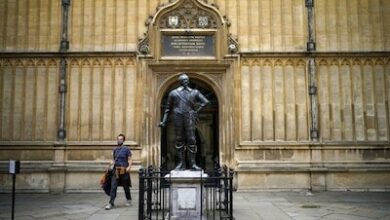Mexico’s most popular president retiring, here’s what he will leave behind | World News

)
But what legacy will the rumpled, grinning Lopez Obrador leave behind? It is perhaps the main question for a man who is obsessed with history | Photo: X@lopezobrador_
Many Mexicans will feel a deep sense of loss when folksy, charismatic, nationalistic President Andres Manuel Lopez Obrador leaves office on September 30 and that’s no surprise.
Lopez Obrador himself has spent an inordinate amount of time talking about his own legacy and his place in history over his six-year term, something he brings up at almost every one of his marathonic daily 7 a.m. media briefings.
But what legacy will the rumpled, grinning Lopez Obrador leave behind? It is perhaps the main question for a man who is obsessed with history, and one thing appears clear: he has changed the way politics is done in Mexico, perhaps forever.
Unlike decades of reserved and distant presidents, Lopez Obrador has built a deep personal connection with many Mexicans. He has stripped the office of the thousands of presidential guards, limousines and walled compounds that once characterised it, saying you can’t have a rich government with poor people.
He is a politician who evokes familiarity, he reminds people of a father, an uncle, a grandfather,” said Carlos Perez Ricart, a political analyst at Mexico’s Centre for Economic Research and Teaching. That’s not a coincidence, either. Lopez Obrador constantly praises the traditional family and says it has saved the country.
He does feel nostalgia for some of the social structures of the 1970s in Mexico and nostalgia for the family, said Perez Ricart.
The Mexican leader stakes his movement on cash social-benefit programmes, he likes to compare himself to Roosevelt and many Mexicans think of him with the same fondness that the more patrician FDR inspired in his day.
I think he’s going to be remembered as a president who started big changes, who thought about the people,” said Armando Lopez, 60, who works as a street cleaner.
Marina Fiesco, an office worker taking a break at a Mexico City park with her 11-year-old son, voiced similar feelings.
I feel he does think about the people, said Fiesco. It’s not about left or right, a president has to look out for the people.
Part of that connection is that he talks more, and fields more questions, than probably any other leader in the world.
In his six years in office, he has held about 1,400 televised morning briefings that last an average of 2 1/2 hours each. He tells jokes, talks about his favourite foods, lashes out at critical journalists, makes fun of the opposition and sometimes plays his favourite music videos. Most briefings end with him saying, Let’s go get breakfast.
He frequently says things that are not true. He claims Mexico doesn’t produce fentanyl the deadly synthetic opioid that kills about 70,000 Americans every year even though his own officials have contradicted him. When homicides spiked this year despite his claims to have achieved an 18 per cent reduction he simply ignored the figures.
Many Mexicans seem willing to tolerate the untruths, in part because Lopez Obrador, 70, has mastered a key Mexican folk saying: He who gets angry, loses. He brushes real contradictions and problems off with a chuckle, a stony refusal to discuss them, or his stock phrase, I have other data.
He’s probably the most skilful politician ever to rule Mexico and seems to enjoy some unstoppable motivating force: in all of his thousands of hours of talking, never once has he sat down, taken one sip of water or gone off to use the bathroom.
Influenced by Mexican presidents of the 20th century, Lopez Obrador would have liked to make his mark with big infrastructure projects he is obsessed with railroads and oil refineries and big state-owned companies like the ones that dominated Mexico’s economy in the 1970s, his formative years.
But his building projects have been often ill-planned and will be subject to the withering trends of economic and energy transition. Unlike his heroes from the past, he hasn’t been able to nationalise any industry, and has only been able to fight a rear-guard action to defend the indebted, struggling state-owned oil and electric power companies he inherited.
Nor has he been able to make much of a mark in foreign policy, apart from a few rather pointless, unresolved disputes with Spain, the Vatican, Ecuador and Peru. In the face of US pressure, he has used the 120,000-member national guard he created not to confront drug cartels, but to prevent migrants from reaching the US border.
And his social programmes like the $150-per month payment to people over 65 can fade, be defunded or eviscerated by inflation.
I think that what we are going to see is the balkanisation’ of Obrador-ism,” said Prez Ricart, a dispute between the left and the right to own the term, a bit like what happened with Peronism in Argentina.
(Only the headline and picture of this report may have been reworked by the Business Standard staff; the rest of the content is auto-generated from a syndicated feed.)
First Published: Sep 25 2024 | 11:27 AM IST




